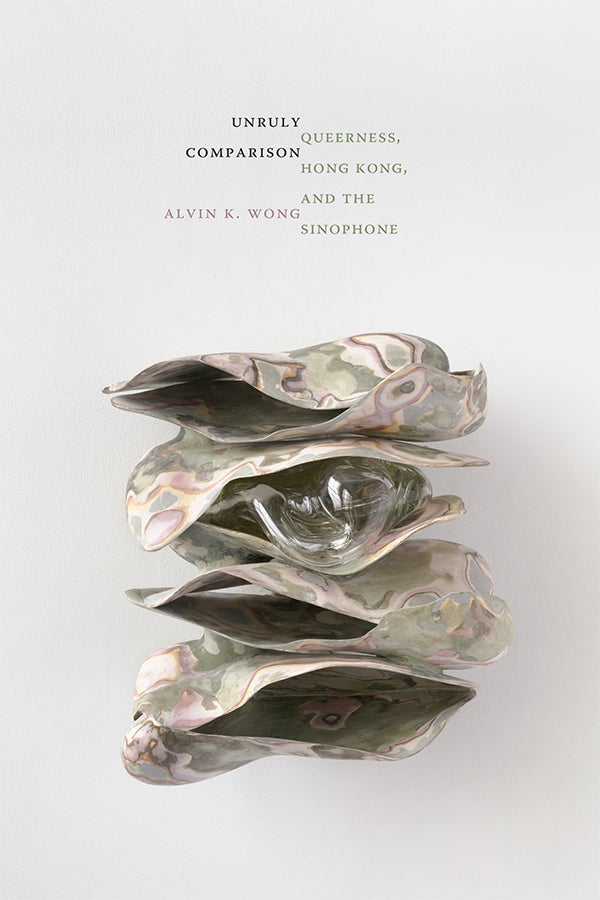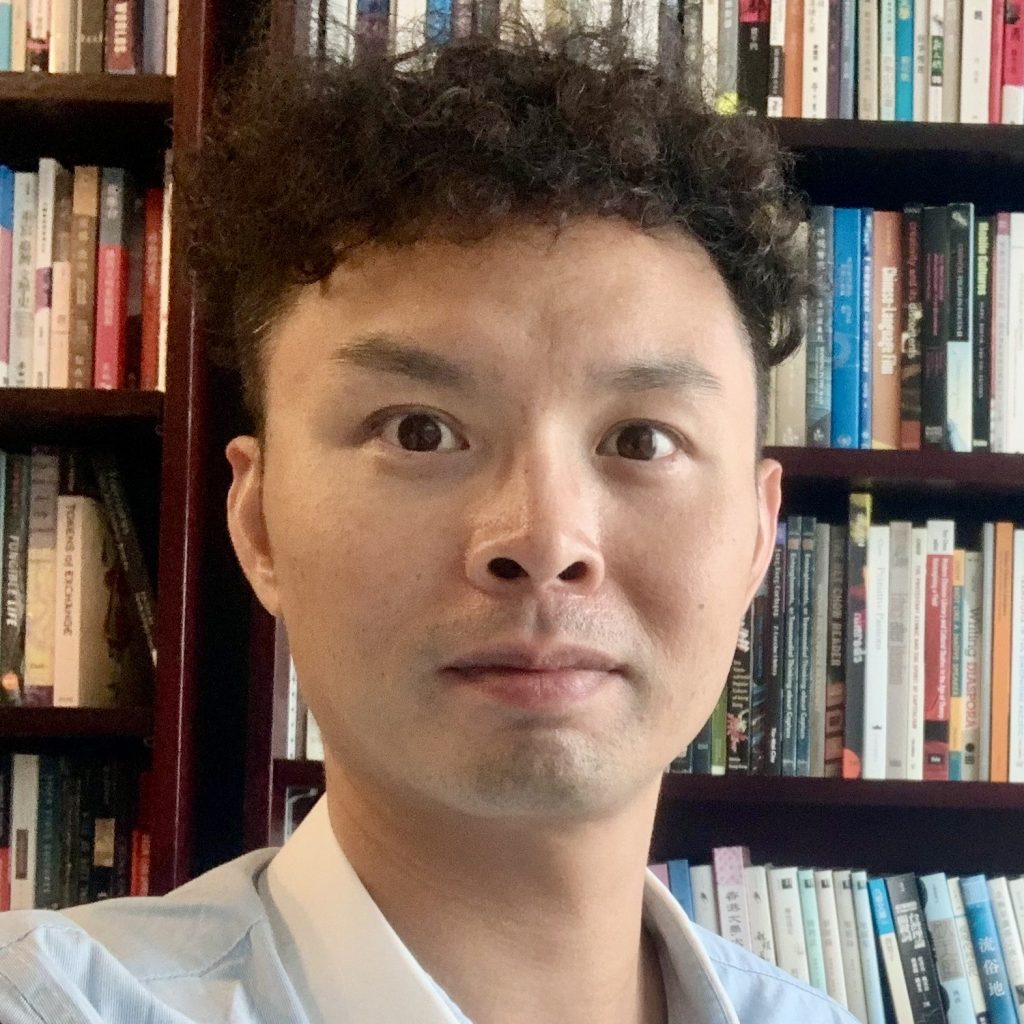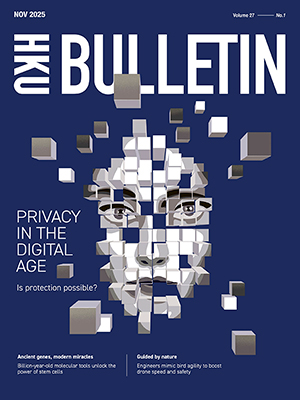May 2025 | Volume 26 No. 2
Unique Perspective
Listen to this article:
After the Sino-British Joint Declaration of 1984, many filmmakers and writers in Hong Kong and elsewhere speculated on the possibility of a resulting identity crisis. Professor Alvin K Wong, Assistant Professor in the Department of Comparative Literature, says that Unruly Comparison is a response to this preoccupation with identity and looks at how filmmakers visualise Hong Kong as a queer time and place mediated by multiple power relations.
“Queer culture is always already unruly and transnational in Hong Kong and we see that in the movies of the time,” he said. “I’m interested in a more global perspective. Sometimes the transnational aspect of Hong Kong takes us to spaces beyond – it’s what I term queer transnationalism in a minor key.”
The book – which is subtitled Queerness, Hong Kong, and the Sinophone – spans 25 years and makes comparisons between films, novels and visual artworks of the post-1997 period.
For example, Professor Wong examines Wong Bik-wan’s feminist novel Portraits of Martyred Women (1999) which imagines the possibility of feminist solidarity and lesbian intimacy during 1940–70s Hong Kong, alongside director Jacob Cheung’s Intimates (1997), a film of lesbian eros and regionalism. He then brings in Ma Ka-fai’s queer novel Once Upon a Time in Hong Kong (2016), which presents a story of colonial complicity and interracial desire in the affair between a Scottish officer and a local mafia boss during the Second Sino-Japanese War.
“World War II is a time period often only associated with the Japanese invasion, British defeat and then victory. Putting the two novels together is a way of imagining queer desire in Hong Kong modernity,” said Professor Wong. “My book demonstrates that queer Hong Kong culture exemplifies unruliness that exceeds the political forces and epistemological limits of British colonialism, China-centrism and global capitalism.”
Global intimacies
The second chapter explores Hong Kong cinema as a rich site for queer Sinophone theory, positioning the city as a geographic locale through the visual mapping of global intimacies and connections. “Queerness in Hong Kong cinema precisely points to modes of disorientation and transnational mobility that deviate from the geopolitics of British colonial legacy and China-centrism,” said Professor Wong.
“This chapter examines queer non-relationality to Chinese-ness in independent filmmaker Scud’s two films, Permanent Residence (2009) and Amphetamine (2010), which links Hong Kong with Guangzhou in China, Thailand and the Israeli occupation of Palestinian lands, and maps queer desire across Australia and Hong Kong, respectively.”
He also offers a critical legal analysis of transgender rights in Hong Kong, and makes a comparison between the film Tracey (2018) directed by Jun Li by mapping the condition of being transgender through multiple queer temporalities and transnational spaces, and then contrasts it with Maisy Suen’s film, A Woman Is a Woman (2018), which narrates the struggle of a married transwoman named Sung Chi-yu and the life of a feminine high school boy, Chiu Ling-fung. The chapter concludes with an analysis of a series of photo exhibitions of transgender subjects, entitled Transcendence, that were inspired by Suen’s film and organised by Mimi Wong.
Rich cinematic domain
“Hong Kong cinema is a rich domain for negotiating and portraying legal disputes about transgender rights,” said Professor Wong. “While Hong Kong is a global ‘world’ city, it doesn’t have some basic LGBTQ rights legislation. It’s interesting that some companies that want to appear as queer- and diversity-friendly introduce queer liberal aspects themselves – for example, by offering medical insurance for gay partners – but it’s not the law.”
In another chapter, Professor Wong puts the focus on domestic helpers, specifically queer desire among migrant domestic helpers. “We see them gathering on Sundays and among them are butch-femme lesbian couples and we know such gay groups as Filguys Association Hong Kong exist. So, this chapter is a necessary study of queer Filipino women who are ‘invisiblised’ in Hong Kong and it questions the ‘heteronormative assumption’ assigned to domestic helpers.”
He examines the situation through two documentary films – Susan Chen’s Lesbian Factory (Taiwan, 2010) and Sunday Beauty Queen (2016) by Baby Ruth Villarama, which focusses on Filipino beauty pageants and a butch organiser.
“I very much see my book as making a case for doing more ‘unruly’ forms of global comparison that move beyond the constant need and pressure for interdisciplinary scholars to justify the geopolitical and cultural importance of a small region (like Hong Kong),” said Professor Wong.
“I suggest that Hong Kong matters to queer theory (and vice versa) beyond its local particularism, postcolonial ‘Chinese’ differences, and capitalist exceptionality. Alternatively, queer Sinophone studies offer a non-totalising perspective on Hong Kong itself as a site of racial, gender, sexual and cultural incommensurability and intersectionality. In turn, this recognition of Hong Kong’s queer worldliness binds it to the rest of the world and engenders unruly modes of comparison.”

Unruly Comparison: Queerness, Hong Kong, and the Sinophone
Author: Alvin K Wong
Publisher: Duke University Press
Year of Publication: 2025
Queerness in Hong Kong cinema precisely points to modes of disorientation and transnational mobility that deviate from the geopolitics of British colonial legacy and China-centrism.

Professor Alvin K Wong

